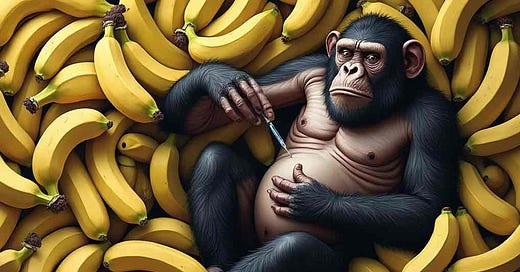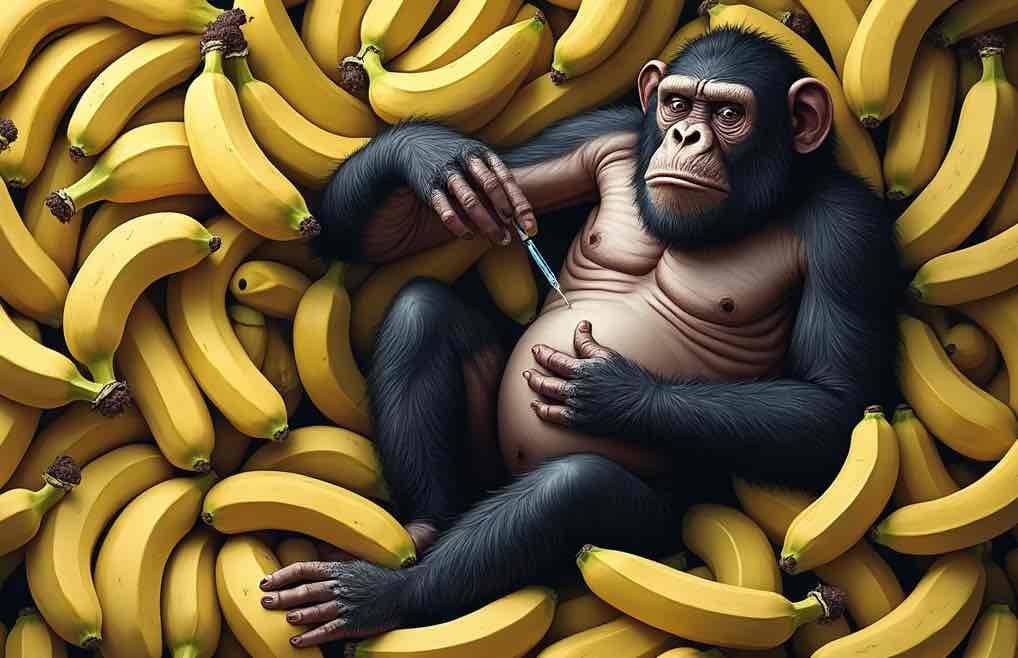Am I just an ape with unlimited bananas?
Lately, I’ve been feeling a gnawing tension between my worldview and my personal life. I cheer the tech-bro rallying cry of “abundance” — the belief that technological progress brings material benefits — and marvel at breakthroughs in energy, AI, and medicine for their potential to elevate humanity.
Yet, in my own life, I am drowning in abundance. And I don’t mean that as some sort of humble brag. Whether it’s food, social media, or Netflix, I struggle with saying “no” to excess. Finding moderation is a constant challenge. Too much is too readily available on my phone, TV, and kitchen shelves. It’s hard to resist. The lure of sugar, fat, dopamine, alcohol, and mindless scrolling lures my senses and sometimes overwhelms them.
Oh look! My phone buzzes with another notification.
I face the same struggle as a parent. Managing screen time for my kid is tough when cartoons can be accessed 24/7 on multiple devices. When I was a kid, cartoons were a Saturday morning treat. Don’t get me wrong, I prefer today’s entertainment options, made possible by the Internet and other technologies. Getting to watch “The Perfect Couple” on Netflix and “Slow Horses” on Apple+ any time I want is amazing. But I’d be lying if I didn’t acknowledge the drawbacks: the decision fatigue, the ease of a binge, the need to monitor my kid’s usage like a lifeguard at the beach.
So I’m left with this question: what is the Pareto-optimal mix of materialism for living a good life? How can I enjoy the fruits of abundance without letting them distract me from finding meaning and joy?
I first heard the metaphor of “apes with unlimited bananas” in a podcast with Nick Bostrom, the influential Oxford philosopher who authored Superintelligence and Deep Utopia. The metaphor resonated because it captured the inner tension I’ve been feeling. I also thought it was funny. I pictured others as apes surrounded by endless bananas, and the image made me cackle. What if the apes get so fat on unlimited bananas that they need Ozempic??! For me, “unlimited bananas” speaks to the dilemma of abundance: tremendous benefits but also unintended consequences if unchecked, including distraction.
For most of history, humans have been wired to say “yes” to more — to eat when food is available, gather information, and accumulate resources as a hedge against scarcity. But today, especially in affluent societies like America, the challenge has flipped to saying “no” to excess. Our Big Gulps, Walmarts and F-150s — our Ventis, Costcos, and Land Rovers — scream MORE! BIGGER! CLICK! BUY NOW! We are built for scarcity yet navigating excess.
Not all abundances are created equal, of course. Abundant clean water is essential to human living in a way abundant ice cream is not. Abundant renewable energy is a net positive, while abundant information is overwhelming without careful filtering. Abundant automation is turbo fuel for productivity, but it’s also a source of dependency, dislocated jobs, and poor critical thinking. Each new technology brings new possibilities, challenges, and unintended consequences. Our task as individuals and a society is to mine the benefits, avoid the pitfalls, and monitor secondary effects like hell before they harm us.
In a decade, when Tesla Optimus-style humanoid robots become household staples, the benefits may be tremendous. But we’d be foolish to ignore potential privacy, security, and dependency issues. Ditto for other technology advancements. Synthetic biology will bring incredible gene therapies to treat diseases, but it will pose biosecurity and ethical issues as well, some of which we can’t even imagine today.
Our culture, like me, is caught in the push and pull of abundance, which is why the company that makes Ozempic has a valuation north of $500 billion. It’s oddly hilarious how techno-capitalism gave us agricultural productivity, then Doritos and other processed foods, and now Ozempic to handle the fallout. The net effect has been positive for humanity — we have far fewer starving people — but it’s a wild ride of profound benefits and unintended effects like mass obesity.
I know I’m not alone in seeking balance and moderation. One friend recently confided about his struggle with consuming pornography. Another shared how Apple Music has ruined music for him; he misses the emotional connection, tactile feel, and curated artistic vision that albums offered.
To thrive amid unlimited bananas, the key is moderation — consuming the right amount of bananas and making space for other aspects of life like humor, love, relationships, and the quest for meaning. Just as I set limits on my kid’s screen time, I need to set boundaries for myself, especially the sugar and dopamine that hijack my biology and mess with my decision-making. I also need to unplug through running, yoga, and time in nature. Even as I write this, there’s a part of me that’s like, Let’s do these things — but not yet! There’s another notification I have to check!!
Ruthless curation is key too. Like a Michelin chef picking ingredients, I need to consciously choose the healthiest selection of bananas — the experiences, information, and relationships I allow into my life. True autonomy comes from taking ownership of my own consumption, even my thoughts.
Smart, proactive regulation is needed too. Individual efforts alone can’t address the externalities and issues of certain technologies, like gene editing or bioweapons. Thoughtful policies can help make sure these technologies serve humanity while mitigating dangers.
We should keep accelerating technology. But let’s not fool ourselves — material abundance can’t solve the human condition. It can’t give us meaning the way love, relationships, and living can. While abundance can lead to greater freedom, autonomy, and flourishing, it can also get in the way. The benefits and pitfalls of unlimited bananas are all around us. When I look in the mirror, I see an ape jumping up and down, trying to make sense of it all and live a good life.
Thanks so much to
, , Lily Luo, Tim Preston, and others for amazing feedback on early drafts of this essay.Related articles:
Music vibe:






I think grocery stores are in a way one of the first cases of unlimited bananas. Quite literally. My parents thankfully raised us more agrarian even though they worked in a grocery store their entire working lives. I think they saw what it did to people. It was and is a pornography of produce.
This metaphor has me thinking "Like a Michelin chef picking ingredients, I need to consciously choose the healthiest selection of bananas". Not just the healthiest but I know I desire to know my farmers. I trust my own produce and those I consume when I feel connected to the producer.
Obviously we want no soul to starve, but we are perhaps collectively discovering what it takes to empower every person to farm. Even if it's a single crop, something to feel apart of creating, in an otherwise limitless sea of consuming.
Great piece Jeff, loved reading it and I know I'll be sitting with this idea more. My best to you.
The best treatise on our endless desire for more and what to do about it is psychologist Timothy Miller's *How to Want What You Have: Discovering the Magic and Grandeur of Ordinary Existence*. The short summary is that our ancestors evolved to be never satisfied with the status, love, and resources they currently had because pursuit of more of those things made them more reproductively successful than individuals who were not similarly motivated. In times of scarcity, the motive to always want more was adaptive, but today with "unlimited bananas" the motivation for more that we inherited causes misery. The solution, suggests Miller, is to cultivate compassion, attention, and gratitude. These three attitudes do not destroy our desire for more, but at least they can take the edge off and reduce our suffering.